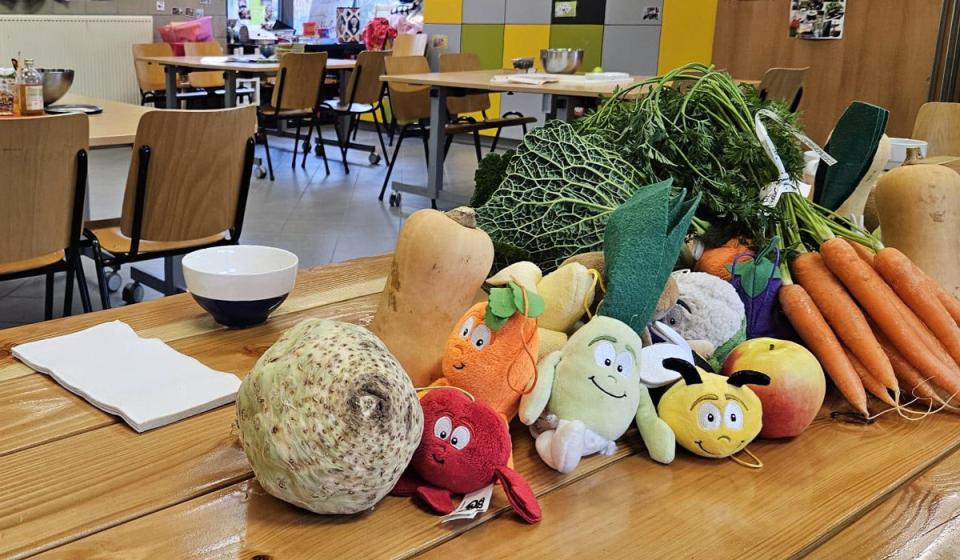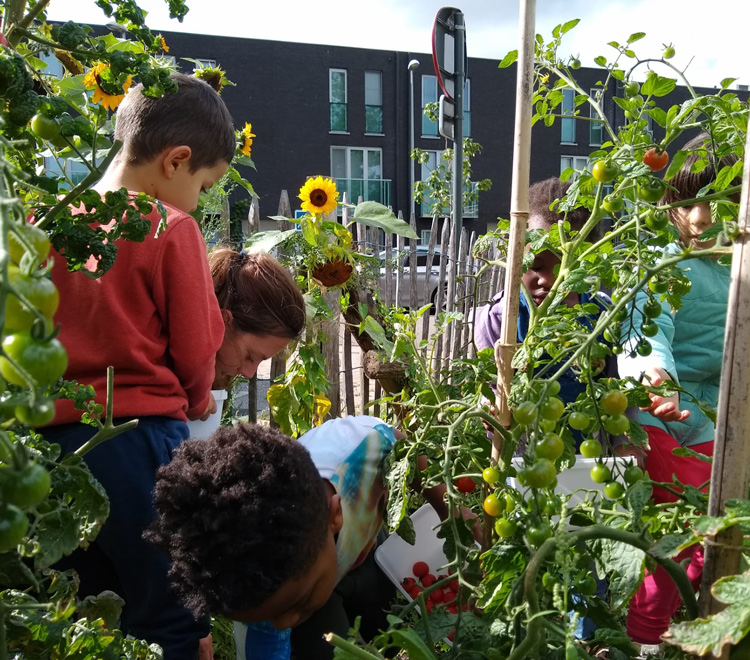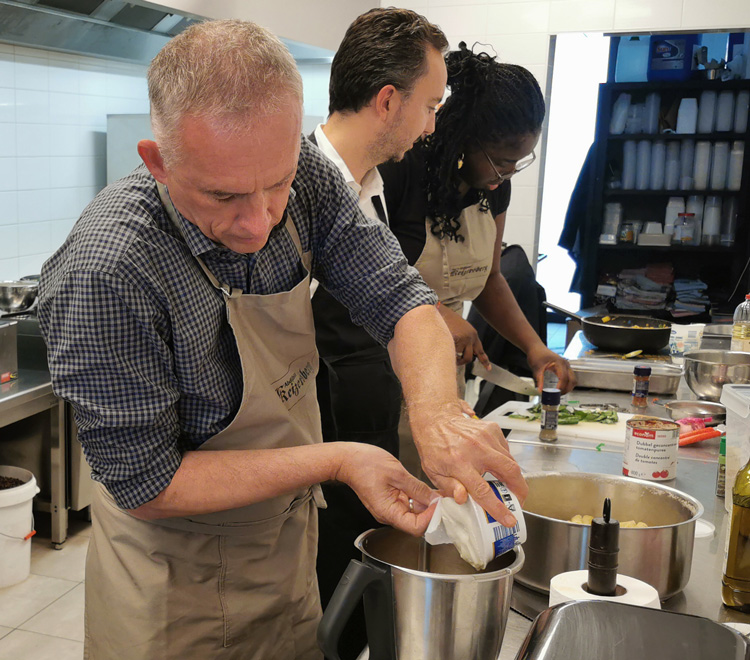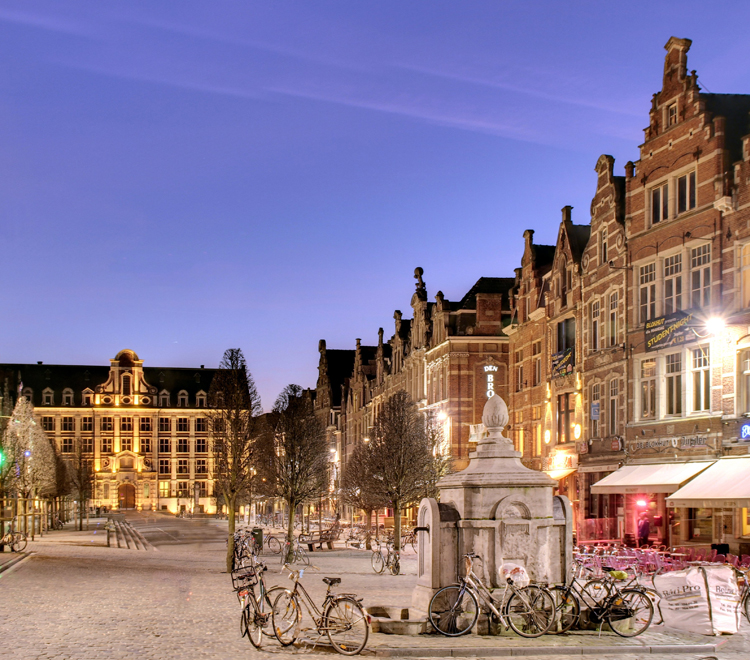Our diet significantly impacts both our own health and the planet’s. But eating a healthy and sustainable diet is not feasible for everyone. In this Living Lab we aim at increasing healthy and sustainable food choices for those with a limited budget in Leuven.
We are building on previous work such as the food strategy of Leuven and the roadmap to a climate neutral future as well as multiple existing food-related projects and organisations.
To achieve a bigger impact, we are working together with those organizations that work with vulnerable target groups in Leuven and have direct or indirect food offers. Our stakeholder group includes stakeholders like community restaurants, solidarity shops, the city of Leuven, universities and neighborhood health centers.
We are testing a community action platform to see if this can be a catalysor for change and can create more individual and collective action around the topic. Furthermore, we further develop our EcoFoodMap that maps all the actors of the food system and measures the evolution of our food strategy ‘Voeding Verbindt’.
Finally, we investigate how we can change perceptions and food habits by using online and offline persuasive communication.
More information about our Living Lab actions can be found on our local website (available in Dutch and English).
Video in Flemish with English subtitles
Who we would like to support?
Everyone has the right to a healthy and sustainable diet. With our Living Lab, we want to support individuals in vulnerable positions so that they can make more healthy and sustainable choices and develop more healthy eating habits. We focus on individuals with a low income. We do this by collaborating with organizations that work with these individuals.
What’s coming next
The next steps are the following:
- Starting the first test phase of the community action platform in collaboration with community workers and community restaurants.
- Further development of the EcoFoodMap.
- Academic study on how adolescents’ eating behaviors can be enhanced.
- Academic study in the community restaurants to improve food choices, attitudes, and cognitions of visitors.
Local Food Challenges
What we eat has an important impact, on our health as well as on the climate. However, a healthy and sustainable diet is not a reality for everyone. In Leuven, there are multiple food-related projects, supported by the food strategy ‘Voeding verbindt’, such as community garden projects, CSA farms and farming projects in public spaces.
Moreover, multiple initiatives aim at improving food accessibility for those with less means, such as the solidarity food shop with a two price system, community restaurants where food is offered at a lower price or initiatives like the ‘Weg(eet)box’, refrigerators where leftover food is offered for free.
Despite these initiatives, access to healthy and sustainable food stays a challenge in Leuven – especially for vulnerable groups. Often, they don’t have enough means, knowlegde or (mental) space to make healthy and sustainable food a priority.
Living Lab Activities
Activities in the Living Lab include:
- Collaborating with and connecting stakeholders working with vulnerable groups and food in Leuven.
- Identifying needs, researching digital tools, selecting and developing a community action platform in co-creating with the stakeholders.
- Investigating in how far a collective action platform can support stakeholder collaboration and increase individual and collective action with regard to more healthy and sustainable diets for vulnerable groups.
- Further developing the EcoFoodMap, an interactive tool that displays and measures the food system in and around Leuven using growth hacking strategies and user feedback.
- Academic study to investigate how social media can be used to improve healthy and sustainable eating behaviour.
Academic study to test a communication strategy in community restaurants to improve healthy and sustainable food choices, cognitions, and attitudes of the visitors.
Get to know the region
Leuven, located in the Vlaams-Brabant region between Brussels and Liège, is one of the ten largest cities in Belgium with a population of 150,000. The city is home to a diverse community of citizens, including students, international residents, and innovators. Leuven is also a mission-driven city, committed to achieving climate neutrality by 2030, among other goals.
Frequently asked questions
- What is the history of the Living Lab?
Living Lab has been established at the beginning of the FEAST project, in September 2022.
Ater refining our concept and assessing the needs of our stakeholders, we have selected and developed our collective action platform ‘GezondxLeuven’. We are currently starting with the first test of the platform in collaboration with community workers and social restaurants.
Furthermore, our ecofoodmap has been further developed. We are currently working on a new release.- Who are the stakeholders?
The core team of the Living Lab consists of:
- Leuven 2030, a non-profit network organisation which supports the transition to becoming a climate neutral city. Leuven 2030 leads the community and tech-based actions of the Living Lab.
- KU Leuven, a university renowned for its qualitative education and innovative research.
The Communication department, more specifically the Media, Information and Persuasion Lab, is involved in this project. They lead the academic-related actions of the Living Lab. - SAAMO Vlaams Brabant, an organisation that creates opportunities for vulnerable groups. They have multiple projects aimed at providing access to food. They are a partner within the Living Lab.
Since 2023 we are collaborating with multiple organisations that are working with vulnerable groups and are having a food offer, such as the city of Leuven, community centers, the community health center, the solidarity shop, School 2030, Rikolto,..
Leuven2030
Marie Mauer
www.leuven2030.be
October, 2025
Ready to scale up: FEAST shares lessons learned with 9 new ‘Replicator Cities’ - EN
Klaar om op te schalen: FEAST deelt resultaten en leerlessen met 9 ‘replicator cities’ - NL
April, 2025:
Ten Leuven-based partners join forces for healthy and sustainable food - EN
Tiental Leuvense partners werken samen rond gezonde en duurzame voeding - NL
January, 2025:
Cooking and connecting: Leuven works on healthy and affordable food - EN
Samen koken en verbinden: Leuven maakt werk van gezonde en betaalbare voeding - NL
Testimonials from our community
How Leuven Is Building Healthy, Sustainable & Connected Food Communities | FEAST Living Lab
In our three-part video series, we take a look at the work of our FEAST Living Lab in Leuven. We showcase local activities at the community restaurant and show how collaboration between different organisations has helped to share knowledge, strengthen skills and enjoy new healthy dishes.
All the videos are in Dutch, with subtitles in both Dutch and English.
Watch other videos of the Leuven Living Lab series:
Part 2. Making an impact together in Leuven's community restaurants | FEAST Project
Part 3. Community Meals that Inspire Healthy Eating in Leuven | FEAST Project



